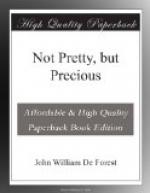I asked until the next day to consider the matter—whether it would be better to take service with you, exchange for my boarding, clothing and incidental expenses the daily care of your comfort and pleasure, or earn my bread in the old wearing way. And the second day after that we were married. That is all. I believe that to be a simple statement of the facts in your case: I am right, am I not?
The day after our marriage your lady-love and her paternal ancestor came. At my own suggestion and with your eager consent I received them, and the result you know.
Now for my own reasons for this strange marriage. You are aware that my father was a professor of mathematics in various schools and colleges of the city where he lived, teaching in the school, among others, in which your sister and myself were pupils. I believe you know that when a young man he had eloped with and married one of his scholars, the daughter of a rich and proud family, who discarded her. For years she was a stranger to them, until her husband had won a name and handsome fortune for himself: then she was taken into favor again, her husband’s distinction in the scientific world being supposed to add lustre to the family name. Alas for us! it was a favor that has cost us dear. I was their only child. When my sweet, pretty mother lay dying she left to me, her sixteen-year-old child, my dreamy, unworldly father as a legacy. “Take care of him: he knows no guile, and your uncles will wrong him if they can,” she said. And they did, or one of them. Ere the bitter agony of my mother’s death had enabled him to return to his duties, it was discovered that one of her brothers had forged his name and literally stripped him of everything.
Of course, then he went to work again to earn our daily bread—not with his old love or ability, but in an inert, feeble way that was pitiful to see. I think from the day my mother was buried he was dying. Some people, you know, die hard—some part with life lightly, as if it was a faded robe they shook off to don a brighter one. Others—my father was one, and I am like him—see one by one their trusts, their hopes, their loves die: then with a deathly throe sunder themselves from life. But pardon my digression.
When I was twenty my father died. Since then, spite of expressions of disapproval and offers of support from my mother’s family, I have maintained myself by teaching in the schools where my father had been known, preferring to do without assistance so long as I had health. One of my uncles desired to take me into his family, and thus wipe out the wrong done my father by his brother, and my aunts proffered me an income out of their private means. I mention this to do them every justice, but I think even a man of fashion like yourself will acknowledge the impossibility of my accepting, while I could avoid it, a life of dependence. I could not accept favors from those who had treated my dear parents unkindly; so I have e’en gone my own way for these last ten years, and led a not unhappy life, if a busy and rather wearing one.




